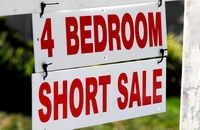Advertisement
California AG Brown warns of spike in short sales fraud

California Attorney General Edmund G. Brown Jr. has joined the California Department of Real Estate (DRE) and the State Bar of California to warn homeowners about an alarming rise in short sale fraud across California in a field "rife with scam artists." "While short sales can provide homeowners with a last-ditch alternative to foreclosure, this market is rife with scam artists," Brown said. "Homeowners and buyers, agents, and lenders should beware of short sale negotiators who operate without licenses, use straw buyers or charge illegal fees."
With so many homeowners now considering short sales, an entire industry of so-called short sale negotiators has emerged. These individuals solicit homeowners by promising to expedite the process and help coax lenders into taking part in the transaction. The Department of Real Estate (DRE) is investigating more than 40 complaints of short sale fraud, up from "virtually zero" cases only three months ago, a spokesman said.
In April, the Obama Administration launched the Home Affordable Foreclosure Alternatives (HAFA) program, which encourages homeowners in financial distress—especially those who have failed to complete a trial modification or qualify for a loan modification—to consider a short sale as an alternative to foreclosure.
Before working with or paying any short sale negotiator, homeowners should consider the following red flags:
No license
With limited exceptions, only licensed real estate agents or attorneys can engage in short sale negotiations with a homeowner's lender.
Upfront fees
Licensed real estate agents wishing to collect upfront fees from homeowners for short sale transactions must first submit an advance fee contract to the Department of Real Estate and receive a no-objection letter.
Surcharges
With many distressed properties listed well below market value, negotiators and agents are charging potential buyers thousands of dollars in surcharges and hidden fees just to place an offer on a home. These illegal fees are frequently not disclosed and are paid outside escrow.
Straw buyers and house flipping
In this scheme, short sale negotiators misrepresent the market value of a property to a homeowner's lender by only submitting offers on the property from an affiliated straw buyer. After the home is purchased below market value, the fraudsters immediately flip it and pocket the difference. Short sale negotiators and agents use a number of titles including debt negotiator, debt resolution expert, loss mitigation practitioner, foreclosure rescue negotiator, short sale processor, short sale coordinator and short sale expeditor.
"Short sale fraud appears to be the fraud of the moment, and it is proliferating statewide," according to Real Estate Commissioner Jeff Davi. "Consumers, licensees and lenders must all arm themselves with the tools necessary to avoid such scams."
For more information, visit www.ag.ca.gov/loanmod.
About the author





